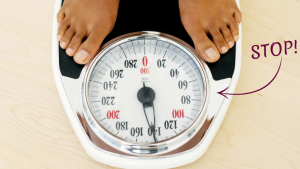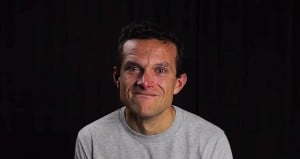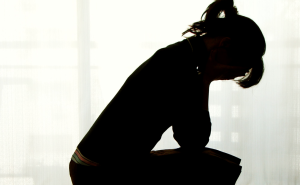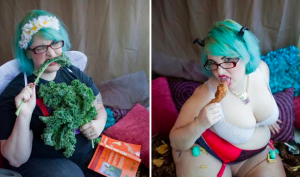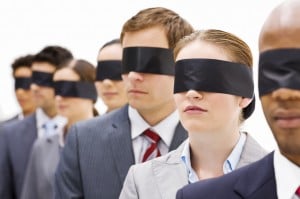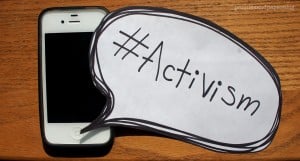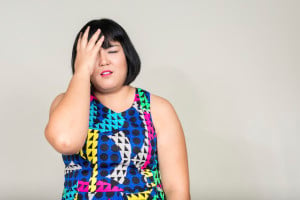Originally published on Adios Barbie and republished here with their permission.
In the same way that John Green describes the process of falling in love in The Fault in Our Stars, my troubles as a new mother started slowly, and then happened all at once.
I always wanted to be one of those mothers who instantly bonds with her child, who people look at and say, “Motherhood suits her.”
I never imagined that the first few years of my life as a new mother would be riddled with post-partum depression, a suicide attempt, and what initially started as a diet morphed into a full-fledged eating disorder.
That wasn’t part of the plan. But as we know, things rarely go the way we want them to.
I felt disconnected from my son from the start. But my doctor told me it was probably just a mild case of the “baby blues,” where moods can shift due to the sudden imbalance of hormones. They normally level themselves back out, but it seemed mine didn’t work that way.
I grew increasingly depressed and antsy. I struggled with my new “mommy” identity and my new body. A suicide attempt landed me in the hospital for a few days while doctors worked to find a medication combination that would work for me.
After several weeks, I felt better. I was still toting around some baby weight (and then some) from the pregnancy. When a stranger asked me how far along I was (People! Besides the fact that it’s never okay to comment on someone’s body, don’t ever, EVER assume anyone is pregnant!), my in-the-gutter body image plummeted even further.
I vowed to shed the weight fast.
Mothers face the unrealistic expectation that they’ll lose the baby weight quickly. The baby has only been out of your body for mere days when the questions start.
“Has your doctor OK’d exercise yet?” “What is your plan to lose the weight?” “Did you know you can start doing minimal exercising right now?”
Inside, I felt torn. On one hand, I bought into those expectations myself. I was a frequent gossip rag reader at the time, and saw celebrities drop weight in a couple of weeks.
But on the other hand, I was perplexed.
You guys, I just grew a human inside of my uterus and then pushed it out. It was fully grown. A human being.
I can’t even.
But weight loss quickly became an obsession for me, something that I spent most waking hours thinking about.
Soon I had lost my baby weight, but it wasn’t enough to satisfy me. In my mind, I still had miles to go.
I started working out, but it progressed into an unhealthy obsession. Balanced meals began to dwindle to meager snacks, and then soon not even that.
When things became very bad, I had to quit my job because it zapped what small energy I had. I stayed at home with my toddler while my then-husband worked.
I didn’t have the energy to maintain a job, and I certainly didn’t have the energy to keep up with a growing toddler.
All I could think about was food: what my next meal would be, how many more calories I was allotted, what I needed to do to burn those calories off.
I walked in circles around the small perimeter of my apartment, trying to burn calories while my baby tottered after me.
Afterwards, I would collapse on the floor, exhausted from the exertion. I couldn’t wait for his nap time; I could sleep the time away to avoid feeling hunger pangs.
I remember being hyper-focused on what my son ate. Even though I was starving myself, I wanted to do everything in my power to make sure his meals were always balanced and plentiful.
Even when he was old enough to hold a utensil, I would feed him myself, and was even known to follow him around with a forkful of chicken, trying to convince him to have “just one more bite.”
I was terrified of passing on my dreadful genes, particularly the one keen on depression and starvation. I was afraid he would pick up on my flaws and start worrying about his intake.
When I was a little girl, I remember watching my own mother struggle with her weight and her constant battle with depression. She taped “Before” and “After” photos of herself to the fridge after completing one of her many diets.
I couldn’t understand this struggle. My mother was perfect to me.
But she was always unsatisfied with her appearance and bounced from one popular diet fad to another. She grew increasingly depressed; my dad was in the Air Force, which separated her from her family at a vulnerable time.
She was a new mom and had never been apart from her family. She was weepy and consoled herself with food, only to berate herself and restrict intensively on unsustainable diets.
I couldn’t know then all of the demons that raged inside of her.
Because of my experience growing up with my mother, I tried my best to be secretive in front of my son about what I was doing.
Even more challenging was trying to hide it from other people. I felt like a fraud, a really selfish person pretending to be a caring mother.
When people told me I was such a good mom, a pang of guilt would travel through me. Inside, I knew my parenting was suffering because my anorexia took precedence over everything in my life.
Misconceptions surround our ideas of who does and does not suffer from eating disorders, spurred from the media and so many Lifetime movies I can’t even begin to count.
She’s probably a girl. She’s probably a straight, cisgender, able-bodied, white teenager. She probably comes from a middle-class background and strives for perfection in her everyday life.
And these things are all possible, don’t get me wrong. But what about the marginalized stories?
The people of color, the men, the LGBT* folks, the elderly, the children … The mothers?
Eating disorders don’t discriminate. Underrepresentation can make a sufferer feel alone and sometimes even phony, like their eating disorder doesn’t count because it doesn’t fit the stereotype.
This is dangerous because it results in people who need help not getting the help they need.
While eating disorders are 56% about your genes, the other 44% lies in your environment. My children may have a predisposition for an eating disorder, but I plan to do everything I can to combat it environmentally.
This means only positive body image comments, a focus on our minds and souls over our physical appearance, and promoting a healthy relationship with food. At the first hint of disordered eating behavior, I hope to strike immediately.
I don’t want to risk overlooking a red flag, so I will probably always be on alert. I’ll watch for common signs of an eating disorder, like a sudden preoccupation with food or calories, weight loss, mood changes, social withdrawal, distorted body image, fear of gaining weight, or excessive exercise.
If you or someone you know are exhibiting these signs, please seek help from your doctor or visit NEDA’s website for more information.
Today, I’m fully recovered and have another child, a daughter. I never mention weight or complain about my body around my children for fear I’ll trigger something inside of them.
It haunts me all the time, especially when I hear my 7-year-old son talk about “good” and “bad” foods, or when he talks about how skinny he is in an almost-triumphant tone.
I quickly tell him there are no good or bad foods and talk about all the wonderful and powerful things our bodies do.
Our shapes are just that: shapes. There’s no surefire way to prevent an eating disorder, but with the right precautions and the proper mindset, we can all work to end the cycle.
[do_widget id=”text-101″]
Tasha Sanders is a 2015 Intern with Adios Barbie. You can read her articles here.
Search our 3000+ articles!
Read our articles about:
Our online racial justice training
Used by hundreds of universities, non-profits, and businesses.
Click to learn more


